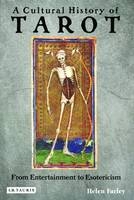
A Cultural History of Tarot
From Entertainment to Esotericism
Seiten
2009
I.B. Tauris (Verlag)
978-1-84885-053-8 (ISBN)
I.B. Tauris (Verlag)
978-1-84885-053-8 (ISBN)
The enigmatic and richly illustrative tarot deck reveals a host of strange and iconic mages, such as The Tower, The Wheel of Fortune, The Hanged Man and The Fool: over which loom the terrifying figures of Death and The Devil. This book explores the remarkably varied ways in which tarot has influenced culture.
The enigmatic and richly illustrative tarot deck reveals a host of strange and iconic mages, such as The Tower, The Wheel of Fortune, The Hanged Man and The Fool: over which loom the terrifying figures of Death and The Devil. The 21 numbered playing cards of tarot have always exerted strong fascination, way beyond their original purpose, and the multiple resonances of the deck are ubiquitous. From T S Eliot and his 'wicked pack of cards' in "The Waste Land" to the psychic divination of Solitaire in Ian Fleming's "Live and Let Die"; and from the satanic novels of Dennis Wheatley to the deck's adoption by New Age practitioners, the cards have in modern times become inseparably connected to the occult. They are now viewed as arguably the foremost medium of prophesying and foretelling. Yet, as the author shows, originally the tarot were used as recreational playing cards by the Italian nobility in the Renaissance. It was only much later, in the 18th and 19th centuries, that the deck became associated with esotericism before evolving finally into a diagnostic tool for mind, body and spirit.
This is the first book to explore the remarkably varied ways in which tarot has influenced culture. Tracing the changing patterns of the deck's use, from game to mysterious oracular device, Helen Farley examines tarot's emergence in 15th century Milan and discusses its later associations with astrology, kabbalah and the Age of Aquarius.
The enigmatic and richly illustrative tarot deck reveals a host of strange and iconic mages, such as The Tower, The Wheel of Fortune, The Hanged Man and The Fool: over which loom the terrifying figures of Death and The Devil. The 21 numbered playing cards of tarot have always exerted strong fascination, way beyond their original purpose, and the multiple resonances of the deck are ubiquitous. From T S Eliot and his 'wicked pack of cards' in "The Waste Land" to the psychic divination of Solitaire in Ian Fleming's "Live and Let Die"; and from the satanic novels of Dennis Wheatley to the deck's adoption by New Age practitioners, the cards have in modern times become inseparably connected to the occult. They are now viewed as arguably the foremost medium of prophesying and foretelling. Yet, as the author shows, originally the tarot were used as recreational playing cards by the Italian nobility in the Renaissance. It was only much later, in the 18th and 19th centuries, that the deck became associated with esotericism before evolving finally into a diagnostic tool for mind, body and spirit.
This is the first book to explore the remarkably varied ways in which tarot has influenced culture. Tracing the changing patterns of the deck's use, from game to mysterious oracular device, Helen Farley examines tarot's emergence in 15th century Milan and discusses its later associations with astrology, kabbalah and the Age of Aquarius.
Helen Farley is Lecturer in Studies in Religion and Esotericism at the University of Queensland. She is editor of the international journal Kthonios: A Journal for the Study of Religion and has written widely on a variety of topics and subjects, including ritual, divination, esotericism and magic.
Introduction
Origins and Antecedents
Renaissance Italy and the Emergence of Tarot
An Alternative Explanation of Tarot Symbolism
The Transformation of Tarot into an Esoteric Device
Across the Channel to England
Tarot and the New Age
Conclusion
Bibliography
Index
| Erscheint lt. Verlag | 30.8.2009 |
|---|---|
| Zusatzinfo | 28 integrated bw, 11 tables |
| Sprache | englisch |
| Maße | 156 x 234 mm |
| Themenwelt | Sachbuch/Ratgeber ► Gesundheit / Leben / Psychologie ► Lebensdeutung |
| Geschichte ► Teilgebiete der Geschichte ► Kulturgeschichte | |
| Geisteswissenschaften ► Religion / Theologie | |
| ISBN-10 | 1-84885-053-0 / 1848850530 |
| ISBN-13 | 978-1-84885-053-8 / 9781848850538 |
| Zustand | Neuware |
| Haben Sie eine Frage zum Produkt? |
Mehr entdecken
aus dem Bereich
aus dem Bereich
der stille Abschied vom bäuerlichen Leben in Deutschland
Buch | Hardcover (2023)
C.H.Beck (Verlag)
23,00 €
vom Mittelalter bis zur Gegenwart
Buch | Softcover (2024)
C.H.Beck (Verlag)
12,00 €


